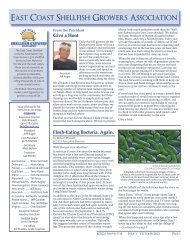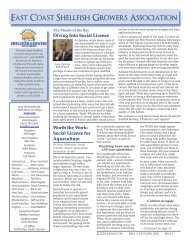East Coast Shellfish Growers Association June 2024 Newsletter
You also want an ePaper? Increase the reach of your titles
YUMPU automatically turns print PDFs into web optimized ePapers that Google loves.
Sorry, But <strong>Shellfish</strong> Will<br />
Not Fix Climate Change<br />
by Robert Rheault,<br />
ECSGA Executive Director<br />
I wish it were true, but unfortunately, shellfish<br />
are not a carbon sink. We can make<br />
a lot of great claims about the benefits of<br />
shellfish, but the scientific evidence does<br />
not support the conclusion that shellfish are<br />
reducing atmospheric carbon dioxide. It is<br />
true that pound for pound, shellfish farming<br />
has an extremely low greenhouse gas<br />
footprint. It is also true that shellfish remove<br />
nitrogen and phosphate from sensitive eutrophic<br />
coastal estuaries and that shellfish farms<br />
provide habitat for juvenile fish and enhance<br />
fish survival and production. We can probably<br />
also make claims about wave energy<br />
mitigation and reduction in coastal erosion,<br />
HAMPTON HISTORY MUSEUM<br />
This circa 1900 photo shows the massive shell pile<br />
at the J.S. Darling & Son oyster packing plant that<br />
loomed as high as six stories over the waterfront<br />
in Hampton Roads, Virginia. Although the carbon<br />
in shell can be sequestered for up to tens of<br />
thousands of years, to be considered a carbon sink<br />
you would need to remove more carbon than it<br />
took to make the shell, so it’s not a carbon sink.<br />
and certainly we can tout the great taste and<br />
nutritional benefits of bivalves.<br />
However, we should not be making the claim<br />
that shellfish farming is going to fix climate<br />
change. Max Zavell, a fisheries postdoctoral<br />
fellow at the School for Marine Science and<br />
Technology at the University of Massachusetts<br />
Dartmouth, published a paper 1 last fall<br />
with Odd Lindahl, Ramon Filgueira and<br />
Sandy Shumway looking at this question.<br />
He also held a session on the subject at the<br />
National <strong>Shellfish</strong>eries <strong>Association</strong> meeting<br />
in March.<br />
The chemistry gets a little wonky so hold on<br />
tight. First, I should explain the difference<br />
between a “carbon sink” and “sequestering<br />
carbon.” A carbon sink refers to the process<br />
that removes CO2 from the atmosphere and<br />
ties it up in another form, preferably for<br />
hundreds or thousands of years. Plants take<br />
up carbon and turn it into carbohydrates, but<br />
that carbon is usually released in short order<br />
when the plant is eaten or decays.<br />
—Continued on page 17<br />
ECSGA <strong>Newsletter</strong><br />
Page 14 Issue 2 <strong>June</strong> <strong>2024</strong>















